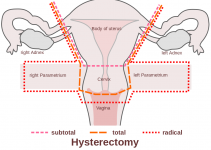Depression can affect us at any age as everything from stress to genetics can play a role. Research shows that over twenty percent of women will suffer from depression at some point in life, but they are more vulnerable during childbearing years. [1]
Many menstrual irregularities are also linked to depression. So, how does the depression affect menstrual cycle? Read on to find out.
Understanding Depression
Depression is a condition that is both serious and sensitive. Caused by a lot of possible things like extreme stress, trauma, hormonal changes, or genetics, it is a severe and pervasive condition that has increasingly affected the lives of those who have it.
This causes a list of symptoms that could be really hard to cope. This includes persistent feelings of hopelessness, worthlessness, sleeping too much or too little, loss of appetite, and many others. Some are even more serious than the ones we have listed.
Because of this, there has been a lot of emphasis on taking serious and good care of one’s mental health. It should be an aspect that should be given importance as much, or even more so, as one’s physical health.
In America, there are about 15 million [2] reported cases each year and a majority of them are women. Among all of those who are experiencing depression, only one-third of them gets or seeks the help they need.
Research has shown that women are more likely to develop depression than men. The numbers also show that more than twenty percent of women will experience this condition but are more vulnerable during their childbearing years.
Moreover, a lot of studies also show that a woman’s menstrual irregularities have links to depression. There are cases that show how depression affect your menstrual cycle.
How Does The Depression Affect Menstrual Cycle?
 As mentioned earlier, there have been known studies that depression may affect a woman’s menstrual cycle. A woman’s body goes through a lot of hormonal changes and this can definitely trigger one’s mood or feelings.
As mentioned earlier, there have been known studies that depression may affect a woman’s menstrual cycle. A woman’s body goes through a lot of hormonal changes and this can definitely trigger one’s mood or feelings.
Before and after the menstrual phase, the woman’s hormonal changes like progesterone and estrogen can have effects on the normal functioning of the brain. If you are depressed during this period, the most common symptoms you may experience could be headaches or anxiety.
There is also one known depression disorder stemming from the woman’s menstrual hormonal changes. It is called premenstrual dysphoric disorder (PMDD) and it’s a more severe type of depression. Its symptoms are more serious than what a woman comes with premenstrual syndrome (PMS).
While there are no specific causes that have been pointed, the hormonal changes may play a role. The symptoms are experienced a week before the onset of the woman’s menstrual phase and may last a few days after it begins.
With PMDD, the woman experiences symptoms that are similar with PMS but only more severe. These can become very debilitating that it may interfere with your work, social life, and relationships. [3]
When you are feeling chronically depressed, stressed and anxious, it might not be the best time to nurture a new life and so your body will shut down its reproductive function under these circumstances. This shut down is generally caused by the stress hormone cortisol.
If cortisol levels increase in response to severe stress, an organ in your brain (hypothalamus) that is involved in regulating your reproductive system will stop sending the right signals to your ovaries.
When these signals are absent, your ovulation cycle will either be delayed or stopped completely to cause absent or late periods.
Many women with depression usually experience worsening symptoms before their monthly periods. A recent study shows that about sixty-four percent of the females with major depression experience symptoms which worsen five to ten days before their monthly period.
If you are experiencing worse symptoms, your depression will last for a longer time than someone whose depression symptoms didn’t change due to the onset of menstruation.
Effects of Antidepressants
Women who are taking antidepressants, like Zoloft and Prozac, may experience pertaining to their menstrual cycle. While it helps a person cope with the behavioral and psychological symptoms of depression, these prescribed medications include different side effects.
These side effects may include: irregular, late, or missed menstrual periods due to its effects on body’s hormonal balance. [4]
Since this is the case, it is always important to talk to your doctor especially if you have concerns about your antidepressant medication and how it could affect your cycle.
The Bottom Line
Living with depression is never easy. The struggles are real and have the potential to worsen one’s condition. In the end, it’s still best to seek treatment and guidance from experts in order to overcome this ordeal.
This can help you find the cause of your depression and have a clear way to heal one step at a time.
Now that you know how depression can affect menstrual cycle, you need to consult a doctor to determine what is causing your condition. The doctor is the best person to diagnose this condition. You might get antidepressants as a treatment.
Some health professionals also recommend therapies such as yoga for depression. Maintaining a balanced diet and a healthy lifestyle will also help to lower the effects.
References
-
1. http://www.idph.state.il.us/about/womenshealth/factsheets/pdpress.htm
2. https://www.nbcnews.com/health/health-news/major-depression-rise-among-everyone-new-data-shows-n873146
3. https://www.webmd.com/women/pms/premenstrual-dysphoric-disorder
4. https://verilymag.com/2015/05/common-reasons-you-may-miss-your-period



